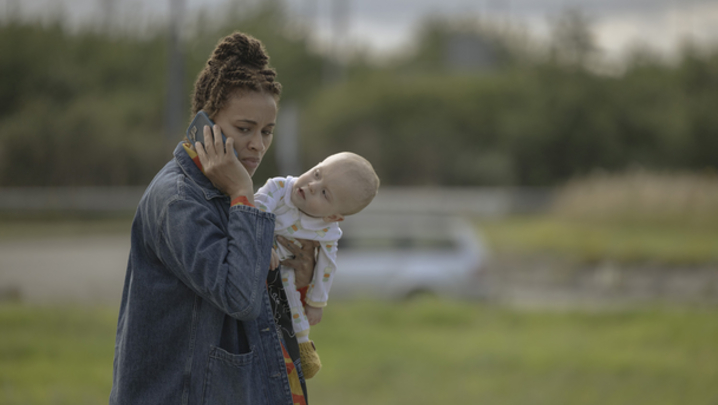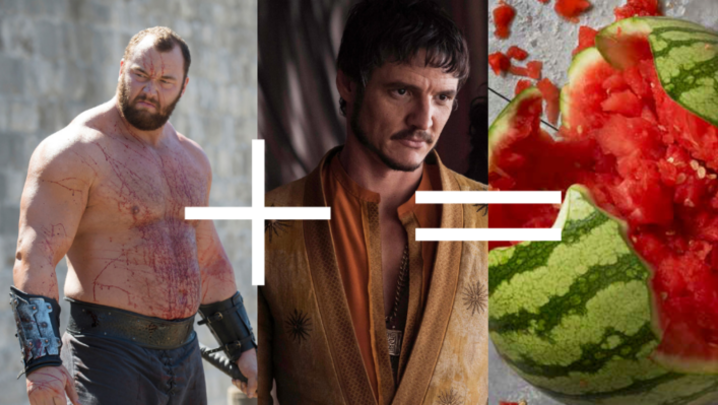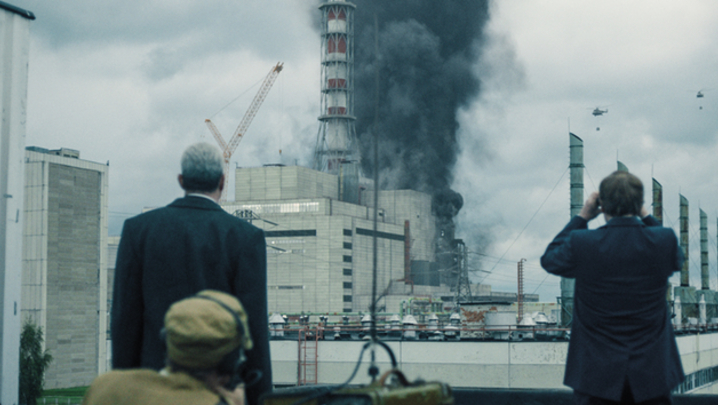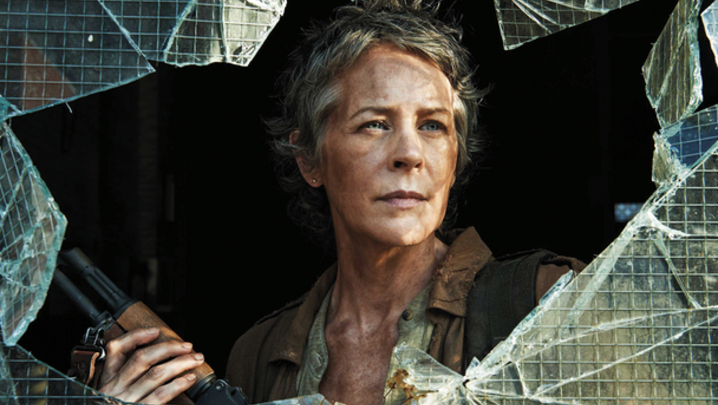Self-effacing and jokey, Sky’s Anne Mensah is an unusual TV executive. Andrew Billen finds out what makes her so unique.
When Anne Mensah left the BBC five years ago to become Sky’s drama head, the broadcaster’s Chief Executive, Jeremy Darroch, made one stipulation: “Whatever you do, don’t do the same. People can get the same for free.”
“And that was the most liberating thing anybody could say,” enthuses Mensah. We are talking in a meeting room somewhere in the Sky HQ in Osterley, west London. Her commissioning team could comfortably join us because there are just six of them.
This may be a healthy indication that ideas here are not imposed from above, on the whim of a controller, but percolate in from outside. Mensah goes so far as to say: “One reason that our way is not to imprint on creatives is because my taste is terrible.”
Admittedly, Mensah is one of the most jokey, self-effacing executives I have interviewed for these pages, and, even more winningly, this is in the context of admitting to loving Sapphire & Steel as a child. Even so…
“There is something,” she says, “about putting the customer first that keeps you honest. It isn’t about whether my mum likes it, or whether critics like it, or whether the industry thinks I’m good. It really does come down to: are you doing something that somebody else, who doesn’t know you, and therefore has no vested interest, thinks is worth paying for?”
She says that, for Sky, it is not about the total numbers a show gets, but how excitedly those who do watch talk about it. The BBC has its audience appreciation index. Sky obsesses over its subscribers’ “passion scores”.
If Darroch was looking for a passion score of near 100% in his creative team, he found it in Mensah, a 44-year-old graduate from ITV, the indie sector and a decade at the BBC. She may even be topping that score when she describes to me her forthcoming Sky 1 drama Britannia, set at the time of the Roman invasion. It will, she promises, encapsulate the idea of “innovation in the mainstream”.
It is only, however, when she reveals who is writing it that I share her excitement. It is Jez Butterworth. No one has persuaded the author of Jerusalem, the best British play of this century, to write for television for 20 years. To qualify this a little, Britannia was not his idea; he came aboard later. Still, Mensah says, we shall hear his voice.
“He’s hugely big-brained. He just brings energy and a sense of excitement.” We shall witness, she promises, a collision between a modern world and a religiously based world, and we shall note the parallels with today.
Britannia, she thinks, would not fit anywhere on the BBC. This is a big claim and it is worth asking if it means much, particularly given that the current BBC mantra is also distinctiveness. Mensah’s examples of distinctiveness at Sky are sometimes as disputable as the BBC’s. She speaks of The Enfield Haunting in May 2015 succeeding at a time when “nobody else was doing ghost stories”. In fact, BBC One’s Remember Me had been broadcast only five months earlier. Enjoyable though Agatha Raisin has been on Sky 1, could it not have sat as happily on ITV? “I definitely think it’s spikier than Midsomer Murders,” she retorts.
Does she think it curious that Butterworth has chosen to write a state-of-the-nation TV show for Sky, rather than for the national broadcaster?
“I would say, ‘Why not Sky subscribers?’ It will obviously go out simultaneously in the UK, Italy and Germany and, at that point, you’re talking to a huge audience. It will also go out in America at the same time on Amazon, so it has a huge range.”
Sky’s native dramas, since she joined, have had their highs and their lows. Well promoted, they often begin with “record” overnight ratings and then taper off. The big-budget Fortitude, for instance, began in 2015 with 700,000 watching live but was seen by fewer than half that number three weeks on.
The much less grand Enfield Haunting, the same year on Living (its last non-acquired drama), beat it with nearly 900,000.
More importantly, people catch up with Sky dramas much more than they do with terrestrial dramas. Haunting reached a further 1.1 million for its consolidated audience. The premier of The Last Panthers on Sky Atlantic last autumn attracted only 228,000 but accumulated nearly 700,000 on catch-up and recordings. Mind you, by week 2 live viewing had halved.
And, mind you again, the debut of the fifth season of Game of Thrones on Atlantic was watched by 1.7 million viewers. Even Mensah, for whom it is not about the numbers, does not pretend that if her British dramas reached such numbers she would lament that she wanted “a more niche audience”.
I quote AA Gill in the Sunday Times on the (now-renewed) thriller The Five: “The real suspense surrounds when Sky is going to manage to make something that is a destination TV moment, and originates in Britain, and doesn’t look like old stars cashing in.”
“Why am I not devastated?” Mensah asks. “Because it’s just not what we’re trying to do. What I’m realising is that we really are playing a different game.”
Perhaps her childhood in south London got her used to being different. Her mother is a Canadian teacher, her late father an accountant from Ghana. They met while her mother was teaching for VSO in Ghana. “I am a little bit global, me,” Anne says. “They sort of picked a country that was halfway between.” It was a happy home.
“The thing about my childhood is that, if you grow up in a family where neither parent was born in the UK, your references are slightly different. Everyone else will go, ‘I grew up reading Tolkien’, whereas I can tell you a lot about Anne of Green Gables [the Canadian classic].”
She is one of an embarrassingly small number of black women in a top job in UK television and actually the only BAME (black, Asian or minority ethnic) member of her own team. But that, she adds, is because Danny Takhar left to write and Madonna Baptiste went on to produce the Sky 1 show Stan Lee’s Lucky Man.
Her department has a clear target that 20% of writers on a multi-authored series should be BAME, plus 20% of the cast, and at least one head of a key department.
“I am incredibly lucky. I mean, God, obviously there are issues around skin colour, but I also think there’s issues round class and opportunity,” she says.
That said, the Mensahs were not well off. Although her sister, who is 10 years younger, went to a private school, Anne went to Sedgehill, a comp in Catford, south London. Television became her “friend”: Dallas, The A-Team and, yes, Sapphire & Steel. Her mother and she cried with laughter at It’ll Be Alright on the Night. The future BBC executive was learning to be totally “un-snobbish” about television – not that this prevented her making short films at school of the “angsty teen” genre.
She graduated from Exeter University with a first in American and Commonwealth arts. There at the same time was Piers Wenger, the new head of drama at the BBC. Midway through university, she took off to UCLA in California, a year that convinced her that there were many more talented directors than her. Back at Exeter, her tutors nevertheless implored her to apply for a management traineeship at Carlton TV.
At the London ITV company, she quickly became script editor for the late-night soap London Bridge, observing its commercial and creative logic. By 26, quite remarkably, she was Managing Director of Noel Gay Television during its Red Dwarf years. She sold The Fear, a series of ghost stories, to BBC Choice and was associate producer on Windrush, which took the Documentary Series prize at the 1998 RTS Programme Awards.
Her parents must have been incredibly proud? “My dad asked when I was going to go back and do my MBA,” she deadpans.
She joined Brighter Pictures, made Cruel Summer, a reality game show for teens, and joined the BBC and its tiresomely named “Fiction Lab” in 2001. She rose quickly, becoming, in 2006, head of TV drama for BBC Scotland. In Glasgow, she met her husband, the TV director Marcus Harben (they have two children, a boy and a girl, aged three and two).
Returning south, she was appointed head of independent drama at the BBC. Within a decade, she had witnessed the renaissance of BBC drama.
“I got to work with Jane [Tranter], watching the transition when she launched Spooks and Auf Wiedersehen, Pet, that sudden flourishing. Greg Dyke gave them £50m extra, I think, and it was incredible to see that many clever people putting their minds to it. To be honest, they’ve never come down from there. They’ve only gone up. The BBC is an incredible space.”
So why did she leave? “Because Stuart [Murphy] said, ‘Do you want to come to Sky?’ I’d been at the BBC for 10 years and he said, ‘We’re having a really good laugh here’. And then Sophie Turner-Laing rang me when I was on gardening leave and said, ‘We’re going to put £600m into original content.’ I was like, ‘Oh wow, OK, that changes everything.’”
It has, too. Sky drama is a source of constant interest and some frustration. As a critic, I love Mensah’s flair and her receptiveness to fresh ideas, but I do wonder whether Sky has the inclination or the cash to make the critical mass of domestic drama from which a breakout hit might emerge. About budgets, she says, Sky never comments.
Her department makes five series a year each for Sky 1 and Atlantic; they just about cover 50 weeks. “We don’t make as much as other channels on purpose, because every single thing we love to death. That’s the whole point.”
Has Sky drama had its breakthrough moment yet? “Probably. We’ve had the breakthrough for our customers: Fortitude, biggest audience on Sky Atlantic ever; Lucky Man, biggest audience on Sky 1 ever; Enfield Haunting, biggest audience on Living ever for original shows. We’ve had big success. I think there’s still room to grow. We haven’t had that point where you become part of the national conversation.”
That is an honest assessment. Our conversation comes back to the biggest drama on Sky: a cult, a phenomenon, a metaphor for Westminster and Capitol Hill, an international conversation – and nothing to do with her.
“I mean, obviously, everybody would want that many people talking about their show globally,” she says, “but was that the ambition the makers went in with? I think all you can do is be as ambitious as you can, and try and get out of the way of creatives so they can do what they want to do.
“I’m going to sound like a really bad 1980s movie now. If you build it, they will come. I really, genuinely believe that. I trust our customers. If it’s good, they’ll come.”






